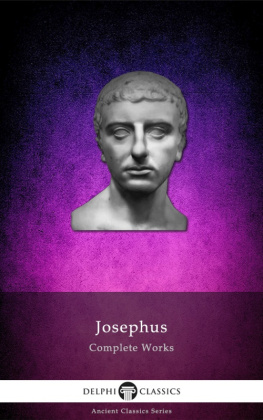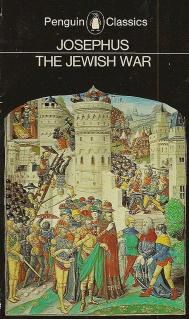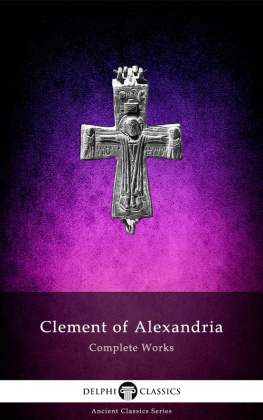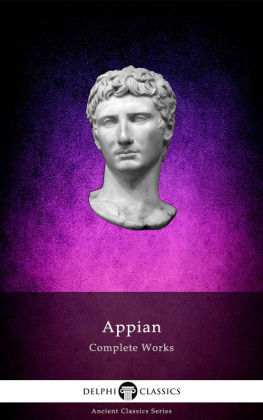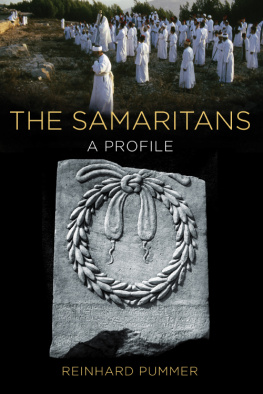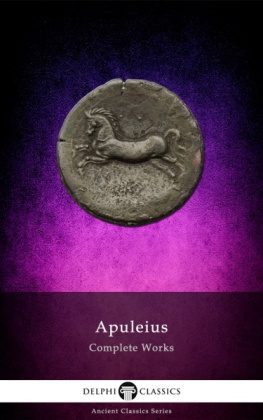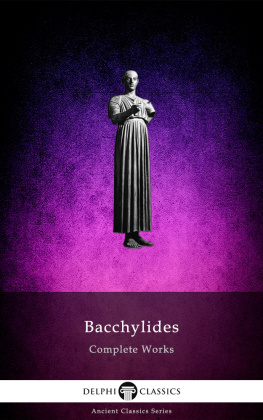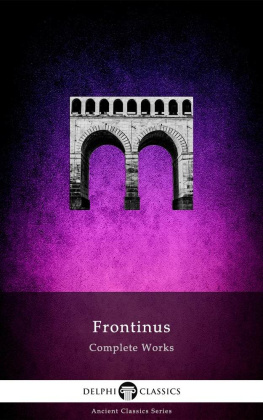
The Complete Works of
JOSEPHUS
(AD 37 c. 100)

Contents

Delphi Classics 2014
Version 1

The Complete Works of
TITUS FLAVIUS JOSEPHUS

By Delphi Classics, 2014
The Translations

Jerusalem (Ancient Judaea) Josephus birthplace. He was the second-born son of Matthias and his mother was an aristocrat, descended from the royal and formerly ruling Hasmonean dynasty.

Reconstruction of what Jerusalem during the 1st century, based on archaeological findings
WAR OF THE JEWS

Translated by William Whiston
This historical work covers events from the capture of Jerusalem by the Seleucid ruler Antiochus IV Epiphanes in 164 BC to the fall and destruction of Jerusalem in the First JewishRoman War in AD 70. War of the Jews was written circa AD 75, originally in Josephus paternal tongue, probably Aramaic, though this version has not survived. It was later translated into Greek, probably under the supervision of Josephus himself. The text also survives in an Old Slavonic version, as well as in a Hebrew text, which contains material not found in the Greek version.
In the wake of the suppression of the Jewish revolt, Josephus would have witnessed the marches of Titus' triumphant legions leading their Jewish captives, and carrying treasures from the despoiled Temple in Jerusalem. It was against this background that Josephus wrote this historical work, aiming to counter anti-Judean views in Rome. In the text, he blames the disastrous outcomes of the Jewish War on what he calls "unrepresentative and over-zealous fanatics" among the Jews, leading the masses away from their traditional aristocratic leaders. Josephus also blames some of the Roman governors of Judea, representing them as corrupt and incompetent administrators. According to Josephus, the traditional Jew was a loyal and peace-loving citizen, who has historically accepted Rome's hegemony precisely because their faith declares that God himself grants empires their power.

Bust of Antiochus IV at the Altes Museum in Berlin Antiochus IV Epiphanes (c. 215 BC 164 BC) was a Greek king of the Seleucid Empire from 175 BC until his death in 164 BC.
CONTENTS
PREFACE
Whereas the war which the Jews made with the Romans hath been the greatest of all those, not only that have been in our times, but, in a manner, of those that ever were heard of; both of those wherein cities have fought against cities, or nations against nations; while some men who were not concerned in the affairs themselves have gotten together vain and contradictory stories by hearsay, and have written them down after a sophistical manner; and while those that were there present have given false accounts of things, and this either out of a humor of flattery to the Romans, or of hatred towards the Jews; and while their writings contain sometimes accusations, and sometimes encomiums, but no where the accurate truth of the facts; I have proposed to myself, for the sake of such as live under the government of the Romans, to translate those books into the Greek tongue, which I formerly composed in the language of our country, and sent to the Upper Barbarians; Joseph, the son of Matthias, by birth a Hebrew, a priest also, and one who at first fought against the Romans myself, and was forced to be present at what was done afterwards, [am the author of this work].
Now at the time when this great concussion of affairs happened, the affairs of the Romans were themselves in great disorder. Those Jews also who were for innovations, then arose when the times were disturbed; they were also in a flourishing condition for strength and riches, insomuch that the affairs of the East were then exceeding tumultuous, while some hoped for gain, and others were afraid of loss in such troubles; for the Jews hoped that all of their nation which were beyond Euphrates would have raised an insurrection together with them. The Gauls also, in the neighborhood of the Romans, were in motion, and the Geltin were not quiet; but all was in disorder after the death of Nero. And the opportunity now offered induced many to aim at the royal power; and the soldiery affected change, out of the hopes of getting money. I thought it therefore an absurd thing to see the truth falsified in affairs of such great consequence, and to take no notice of it; but to suffer those Greeks and Romans that were not in the wars to be ignorant of these things, and to read either flatteries or fictions, while the Parthians, and the Babylonians, and the remotest Arabians, and those of our nation beyond Euphrates, with the Adiabeni, by my means, knew accurately both whence the war begun, what miseries it brought upon us, and after what manner it ended.
It is true, these writers have the confidence to call their accounts histories; wherein yet they seem to me to fail of their own purpose, as well as to relate nothing that is sound. For they have a mind to demonstrate the greatness of the Romans, while they still diminish and lessen the actions of the Jews, as not discerning how it cannot be that those must appear to be great who have only conquered those that were little. Nor are they ashamed to overlook the length of the war, the multitude of the Roman forces who so greatly suffered in it, or the might of the commanders, whose great labors about Jerusalem will be deemed inglorious, if what they achieved be reckoned but a small matter.
However, I will not go to the other extreme, out of opposition to those men who extol the Romans nor will I determine to raise the actions of my countrymen too high; but I will prosecute the actions of both parties with accuracy. Yet shall I suit my language to the passions I am under, as to the affairs I describe, and must be allowed to indulge some lamentations upon the miseries undergone by my own country. For that it was a seditious temper of our own that destroyed it, and that they were the tyrants among the Jews who brought the Roman power upon us, who unwillingly attacked us, and occasioned the burning of our holy temple, Titus Caesar, who destroyed it, is himself a witness, who, daring the entire war, pitied the people who were kept under by the seditious, and did often voluntarily delay the taking of the city, and allowed time to the siege, in order to let the authors have opportunity for repentance. But if any one makes an unjust accusation against us, when we speak so passionately about the tyrants, or the robbers, or sorely bewail the misfortunes of our country, let him indulge my affections herein, though it be contrary to the rules for writing history; because it had so come to pass, that our city Jerusalem had arrived at a higher degree of felicity than any other city under the Roman government, and yet at last fell into the sorest of calamities again. Accordingly, it appears to me that the misfortunes of all men, from the beginning of the world, if they be compared to these of the Jews are not so considerable as they were; while the authors of them were not foreigners neither. This makes it impossible for me to contain my lamentations. But if any one be inflexible in his censures of me, let him attribute the facts themselves to the historical part, and the lamentations to the writer himself only.
Next page
